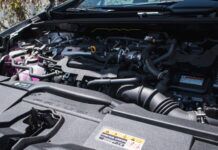SPONSORED CONTENT
Acquiring a car is a big financial commitment that frequently sparks enthusiasm and expectation. It’s important to look below the surface, whether you’re contemplating a vintage model for its charm or a secondhand automobile for its price. Many underlying issues can be covered up by a pleasant test drive and a gleaming façade. As a result, doing a comprehensive vehicle history check is not just advised—it is necessary.
Vehicle History Reports
A comprehensive vehicle history report can reveal issues that aren’t immediately apparent. Utilizing resources like a vehicle vin check provides detailed insights into a car’s past, helping you make an informed decision. This step can protect you from future headaches and financial losses by uncovering hidden damages, ownership disputes, and more.
Vingurus came along with an elaborate vehicle history reporting service, equipping consumers with detailed insights into the past of every automobile by way of VIN checks. By employing this platform, potential buyers can refer to accident history, title records, mileage, previous ownership details, and more, thereby making it possible for buyers to avoid vehicles with unseen problems by making a much more informed decision that is far safer and more reliable. Furthermore, it will provide updates on recalls and maintenance records, adding to one’s confidence in buying. All in all, the platform is an indispensable tool for those who will be dealing or considering a used vehicle for their needs and brings transparency to ensure peace of mind at every step of the buying process.
Since 1981, every vehicle produced has been uniquely given what is known as the Vehicle Identification Number, a 17-character code serving as an automobile fingerprint. It consists of an alphanumeric identifier that carries substantial information about the vehicle’s make, model, year in which it was produced, and features. When decoded, one can retrieve comprehensive records on their vehicle such as accident history, ownership transfers, recalls, and service bulletins. The understanding of the VIN is pretty important in ascertaining how legitimate a vehicle is and what history it has, and is useful when considering buying, selling, or maintaining a vehicle.
Avoiding Hidden Mechanical Problems
History checks are usually carried out on a vehicle to reveal conditions of past mechanical problems or accidents. A car might look just fine from the outside, but it may have critical internal injuries caused by prior collisions. Vehicle history reports identify the number of accidents in the past, the level of destruction, and the repairs made. When you know this, it would provide insight; hence, you will understand whether the car has problems that can be costly to repair or pose a safety risk.
Detecting Flood or Fire Damage
Natural disasters can ruin cars. Most flood and fire damage is followed by very extensive mechanical and electrical challenges that are hardly corrected. Some of these are even pawned off by some unscrupulous sellers without divulging all the information about such vehicles. A vehicle history check can alert you to incidences of flood or fire damage and save you from investing in a car with potential long-term problems costly to repair.
Ensuring Accurate Mileage
Odometer fraud is a scam in which the seller reduces and manipulates a car’s odometer reading to present it as less used. This significantly raises the price of the vehicle in the market. In the report on vehicle history, you will find a series of mileage records that are recorded over time. It helps you identify if the odometer has been manipulated. Buying a car with correctly declared mileage allows you not to overpay for it and plan the future maintenance of it on time.
Verifying Title and Ownership History
A clear title is paramount when purchasing a vehicle. A history check will put across the trail of ownership with any title problems, major ones being salvage and rebuilt titles. These titles evidence that the car has been termed a total loss by an insurance company and rebuilt, which might affect its safety, its resale value, among others. Having a clean title shields you from complicated legal problems and financial risks attached to disputed ownership.
Avoiding Stolen Vehicles
Buying a stolen car can have serious legal consequences, and the car will be taken away without any compensation. A vehicle history report cross-references the VIN with the law enforcement databases to verify that a car is not reported as stolen. This step is taken to save you from getting involved in some kind of criminal activity by mistake.
Identifying Recalls and Safety Issues
Recalls are issued by manufacturers to fix defects related to safety issues at no cost to the owner. A vehicle history check lets you know if there are any open recalls that have not been fixed in that car. If you buy a car with outstanding recalls, you could be putting yourself and your passengers in danger. Knowing in advance lets you have them fixed right away, and the vehicle will then be safe for use.
Understanding Previous Use
Past use plays a significant role in the condition and durability of your car today. If a vehicle has served as a rental, taxicab, or ride-sharing driver, it is most likely to have more wear and tear. Past use is stated in a history report, which should help you determine what could be added to your future maintenance cost. Knowing how the car was put to use in the past gives you a good bargaining position and makes you conscious of the decision you would probably be making.
Assessing Financial Liabilities
Unpaid liens on a vehicle simply mean someone else has a legal claim to the vehicle, generally due to unpaid debts by a previous owner. When you buy a car with a lien on it, you may end up being required to pay that debt. A vehicle history check will show if there are any financial encumbrances on the car, enabling you to ensure all liens are sorted out before you complete the purchase.
Protecting Your Investment
A car is not just a means of transportation; it’s a major investment. You protect an investment by checking its history. The advantages of knowing problems in advance are that you avoid sudden repair bills, legal complications, and decreased valuation due to undeclared damages. It also gives you the bargaining chip in negotiating prices or even walking away from a bad deal.
In vehicle purchasing, knowledge really means power. A detailed history check of any vehicle is just a small step that buys serious protection. That uncovers hidden problems, verifies critical information, and finally brings in peace of mind. Before investing your hard-earned money in a vehicle, invest a little time in unveiling its past. This means due diligence will ensure that the new ride is not only pleasurable but also sound and safe as an investment for the future.






















